Edition: 17 to 28 July 2023
PARTNERSHIP
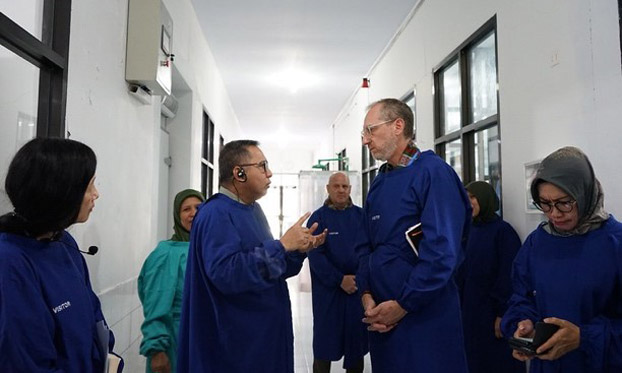 ©fao/Ayunita Mahdy | INDONESIA USAID Assistant Administrator visits South Sulawesi FAO facilitated USAID visitation to South Sulawesi Province from 20 to 21 July 2023 to witness the impactful long-term collaboration between Indonesian Ministry of Agriculture (MoA), FAO and USAID in enhancing animal health system in the eastern part of Indonesia. South Sulawesi has turned into an intervention region that serves as an initiation for strengthening Indonesia's One Health system. During this occasion, USAID Assistant Administrator, Michael Schiffer, along with USAID Mission Director to Indonesia, Jeff Cohen, and accompanied by the Director of Animal Health MoA, paid a visit to Disease Investigation Centre Maros. There, the group had a lab tour to witness the enhancement of epidemiology and diagnostic capacity for improved disease outbreak response. Furthermore, USAID Indonesia's Health Director, Eni Martin, visited a three-zone biosecurity farm in Gowa, which has received FAO assistance over the years. The farm was recently accredited with a Veterinary Control Number (Nomor Kontrol Veteriner/NKV), a government certificate that guarantees the safety of livestock products for public consumption while also helping farmers in increasing their profits through higher-quality products. Following the visit, the MoA-FAO-USAID committed to scale up the joint programme through One Health collaboration, incorporating key government authorities and related stakeholders in order to achieve the common strategic goals of protecting animal and human health from zoonoses and infectious diseases. Read the news HERE. |
EPIDEMIOLOGY
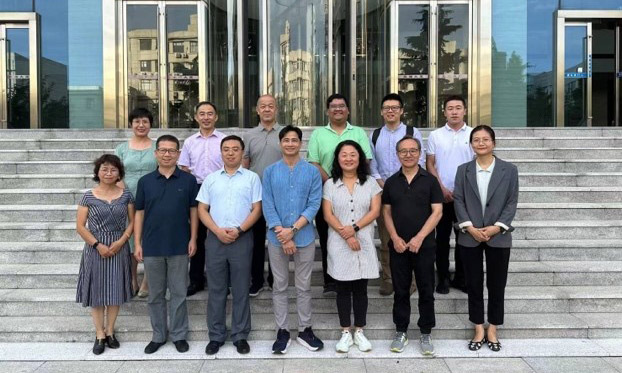 ©FAO | ASIA AND THE PACIFIC Engaging FAO Reference Centre in the regional workforce development in veterinary epidemiology FAO visited China Animal Health and Epidemiology Centre (CAHEC), FAO Reference Centre on veterinary epidemiology on 26 July 2023 to discuss future collaborations on epidemiology capacity development for the Asia-Pacific region. CAHEC presented the progress and achievements since they were assigned as the FAO Reference Centre in 2022. FAO ECTAD Regional Manager Kachen Wongsathapornchai encouraged CAHEC to share experiences and expertise of the China Field Epidemiology Training Program for Veterinarians (CFETPV) with other nations in the region to help them enhance their epidemiological capacities. Initiatives on regional epidemiology network, training tools and materials development were also discussed, and follow-up actions were identified. |
ANTIMICROBIAL RESISTANCE (AMR)
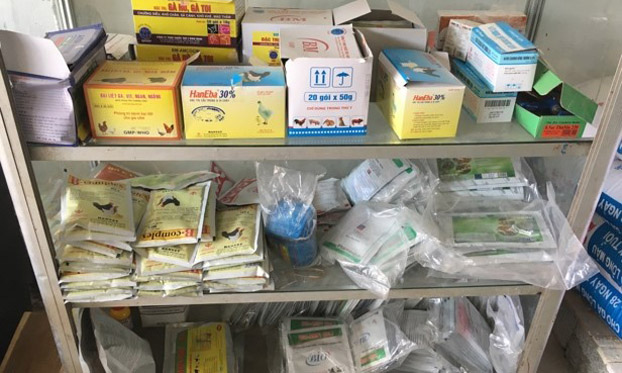 ©FAO/Pawin Padungtod | VIET NAM Measuring the quality of antimicrobial prescription through mystery shopper surveys In Viet Nam, roughly 72 percent of all antimicrobials used in the country correspond to animal production. Medium- and small-scale farmers usually procure antimicrobials in licensed veterinary drug shops. Therefore, the shop owners and their staff are the primary source of advice to farmers on using antimicrobials. They play a vital role in the stewardship of AMR.Over the last two years, following the government regulations restricting antimicrobials intended for farmed animals, FAO and the Department of Animal Health (DAH), with USAID funding, have conducted dissemination workshops on these regulations in several districts. A survey to evaluate the impact of the workshops was conducted by ‘mystery shoppers’ who visited drug shops before and after the workshops. The visits consist of real-life scenarios where farmers present to the veterinary drug shops, and the recommendations are measured using social science methodologies. The workshop is foreseen to improve the quality of advice the veterinary drug shop staff provides to farmers and compliance with existing regulations in Viet Nam. Results from these studies are expected to be available by the end of September. |
RISK REDUCTION
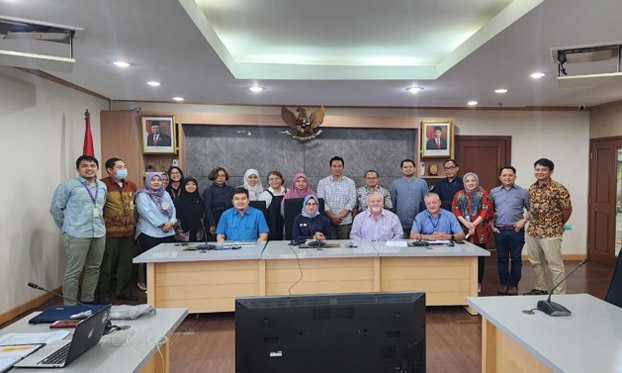 ©FAO/AndriJatikusumah | INDONESIA Foot-and-mouth disease and lumpy skin disease control mission to Indonesia FAO and Indonesian Ministry of Agriculture (MoA) invited an animal health and disease control expert, Peter Black, from 17 to 24 July 2023 to support the implementation of ECTAD programme in Indonesia under Australian Department of Agriculture, Fisheries and Forestry (DAFF) funding, on building foot-and-mouth disease (FMD) and lumpy skin disease (LSD) response capacity. |
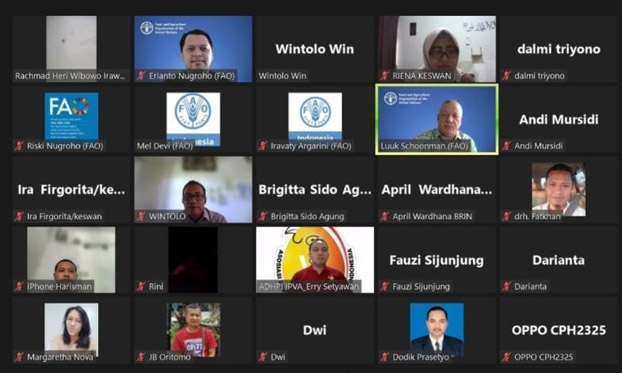 ©FAO/Erianto Nugroho | INDONESIA Monthly forum with poultry stakeholders on coccidiosis cases in poultry |
ONE HEALTH
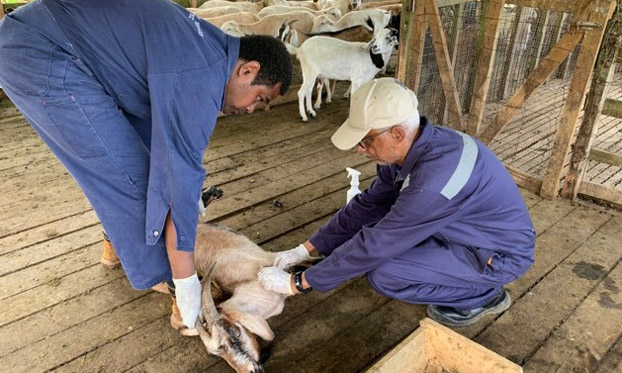 ©FAO/Anand Deo | ASIA AND THE PACIFIC Building One Heath capacities for the Pacific through Virtual Learning Centre With the support of the American Rescue Plan Act Project (ARPA), the FAO Virtual Learning Centre for Asia and the Pacific (VLC-RAP) launched an online course on applying One Health in outbreak management. In total, 54 participants from eight Pacific countries took the 3-week tutored course from 19 July to 9 August. About 55 percent of participants were from the animal health sector, while the rest were professionals from the public health, environment and wildlife sectors. Through various virtual learning modalities, such as problem-based learning, participants will understand the fundamental steps of outbreak investigation and response and how to implement One Health in outbreak management. The course is a continuation of concepts of One Health part I, which was delivered for the Pacific in 2021 and 2022.
|
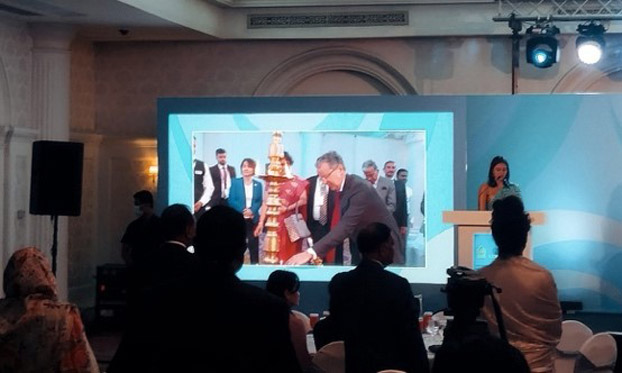 ©FAO/Yin Myo Aye | ASIA AND THE PACIFIC AND BANGLADESH Participation in One Health conferences FAO attended the Conference on Pandemic Prevention, Preparedness and Response (PPR) through One Health approach and the First Meeting of the Bay of Bengal Initiative for Multi-Sectoral Technical and Economic Cooperation (BIMSTEC) expert group on public health from 24 to 27 July 2023 in Colombo, Sri Lanka. FAO Chief Veterinary Officer Dr Keith Sumption contributed as a panelist on regional mechanisms for pandemic PPR. With thanks to USAID, FAO ECTAD in RAP and Bangladesh participated the events and discussed about disease early warning and surveillance, surge capacity and stockpile for the region. |
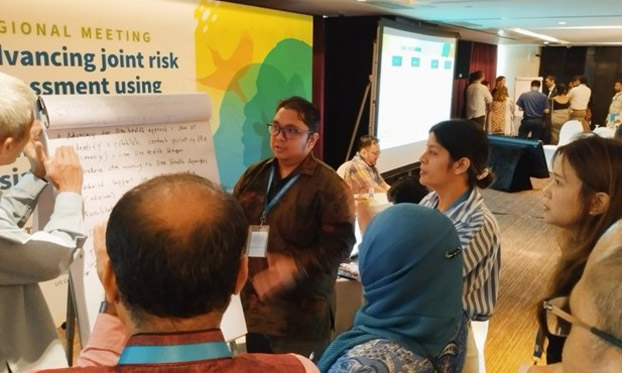 ©FAO/Yin Myo Aye | INDONESIA AND ASIA AND THE PACIFIC Co-organizing the regional meeting on Joint Risk Assessment FAO ECTAD in RAP and Indonesia facilitated the regional meeting on advancing Joint Risk Assessment (JRA) using One Health approach in WHO South-East Asia region in Colombo, Sri Lanka, from 25 to 27 July 2023. Tripartite One Health tools and JRA operational tool were introduced in the meeting. About 36 participants from 9 countries and key partners discussed about managing health threats, and priority actions to further advance joint risk management activities using One Health approach. Read the article HERE. |
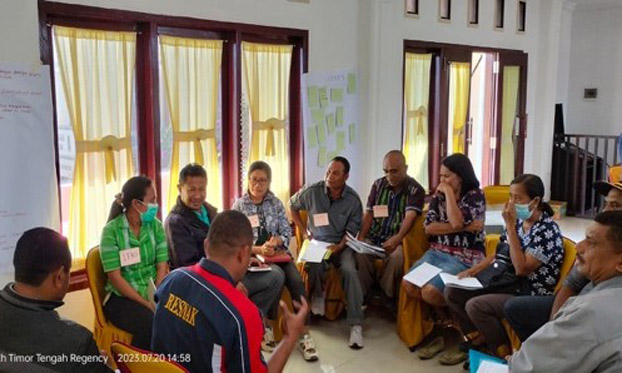 ©FAO/Wahid Husein | INDONESIA Rabies integrated bite case management and vaccination training in East Nusa Tenggara
In response to the recent rabies outbreak on Timor Island, East Nusa Tenggara Province, FAO together with Indonesian Ministry of Health, Ministry of Agriculture, National Development Planning Agency, and Australia Indonesia Health Security Partnership (AIHSP), hosted an integrated bite case management (IBCM) and vaccination training for local public and animal health centres officers from 10 until 14 July 2023. Thanks to USAID for the funding support, this training was held in Timor Tengah Selatan district following the arrival of a thousand rabies vaccine doses from Australian government subsidies in Kupang. The trainers shared their knowledge based on rabies modules which included rabies signs, IBCM protocol, herd immunity, risk communication, cold chain, handling dogs, vaccination technique, disposal, and reporting. The training helped increase the capacity of local officers related to bite case management protocols and helped establish cross-sectoral rabies control networks in each sub-district. As a follow up, the local government will vaccinate all dogs in targeted areas and conduct its monitoring, implement IBCM protocol as well as perform rabies risk communication across the island. |
LABORATORY
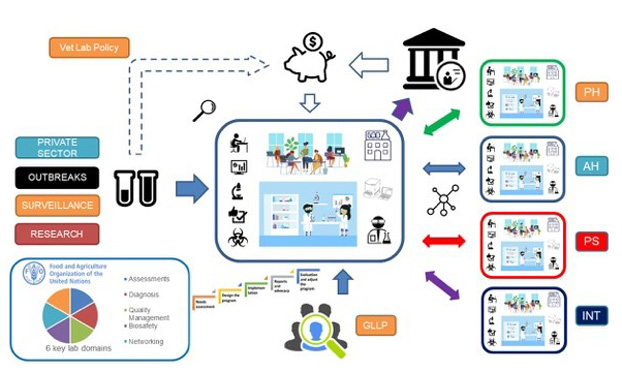 ©FAO/Filip Claes | ASIA AND THE PACIFIC Sharing knowledge on financial management for animal health laboratories FAO ECTAD Regional Laboratory Coordinator Filip Claes participated in the financial management webinar organized by the Global Laboratory Leadership Program (GLLP) - Laboratory Management Series. He presented financial management strategies for animal health laboratories in Southeast Asia's low- and middle-income countries. The webinar focused on laboratory financial management concepts, tools and processes, with over 370 participants participating. |
